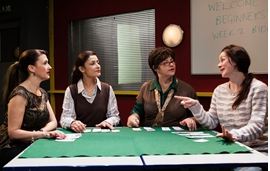Finborough Theatre Presents a Punchy Pack
Penny Flood watches four women tackle big issues in Louise Monaghan's play
Louise Monaghan’s Pack is a good, very watchable, well acted and slightly quirky play about class and racial tensions – and how they affect the lives of ordinary people.
Four women come together every week to play bridge, where they discuss the bigger issues along with more personal things such as friendship, rivalry, competitiveness and sisterly support.
Capable and confident maths teacher Dianna (Denise Black) runs the class, teaching the other three Debbie (Angela Lonsdale), Nasreen (Amita Dhiri) and Steph (Sarah Smart).
Glamorous, edgy widow Debbie is dismayed to discover that she lives in the same road as an Asian – Nasreen, who is a doctor. Debbie grudgingly accepts her because her mother has an Asian doctor.
Finally there’s chatterbox Steph who seems very happy with a nice life and her clever son but her husband is a member of the BNP and he’s going on a march.
Much of this is set to the background of riots with lots of noises off, and of course the action outside encroaches on the lives of the four bridge players inside.
A clever touch is the way the various strategies and tactics employed in a bridge game (trumps, vulnerability, defence, etc) are used here to mirror what’s happening in their lives, although the bridge metaphors are underlined too much.

Week by week they come to their classes, hearts are opened, barriers knocked down, differences aired as we learn their hopes fears and dreams. Bubbling under the bridge games is another darker story that keeps the tension until the end.
The cause of the tension are Jack and Paul, the sons of Steph and Debbie respectively who couldn’t be more different, Jack is doing very well at school and Paul has given up on school and has an ASBO.
The gradual unravelling of the plot is compelling as its reveals these women’s lives beyond the bridge club. They can’t change their real-world situations but they’ll fight like lionesses to protect their families, and ‘strong families’, including the wider support among women for each other is a central theme.
Pack won the PapaTango festival of new writing competition. However, the script and some of the direction by Louise Hill could be tighter. The characters are sometimes a bit two-dimensional and not always believable, for example it is far from clear why vivacious and dolled-up Debbie would want to take Steph to a bridge class or why Steph’s racist husband gives money when he sees starving African children on TV.
There’s also a tad too much going on, both in the crowding in of over-dramatic incidents and issues in the script and a fussiness in the on-stage action. Class and race are major themes on their own but the almost-too-much-to-bear incidents around race don’t allow the class tension between Debbie and Nasreen to be explored meaningfully
.
Clumsy stage direction gets in the way of the flow. The only props are four tables and chairs that are put together for the card games. Each scene change is marked by the chairs being shifted and the tables being pulled apart and put together again.
This was unnecessary and distracting. Just dimming the lights while the cast left the stage between scenes would have been enough as the passage of time is indicated by Dianna’s chronicling of the number of the week’s lesson.
The flaws can be overcome, so it will be well worth watching how Monaghan develops the talent and commitment to exploring contemporary life shown in Pack.
Pack continues at the Finborough Theatre until December 22. You can find full booking information here.
December 14, 2012
Related links
|
